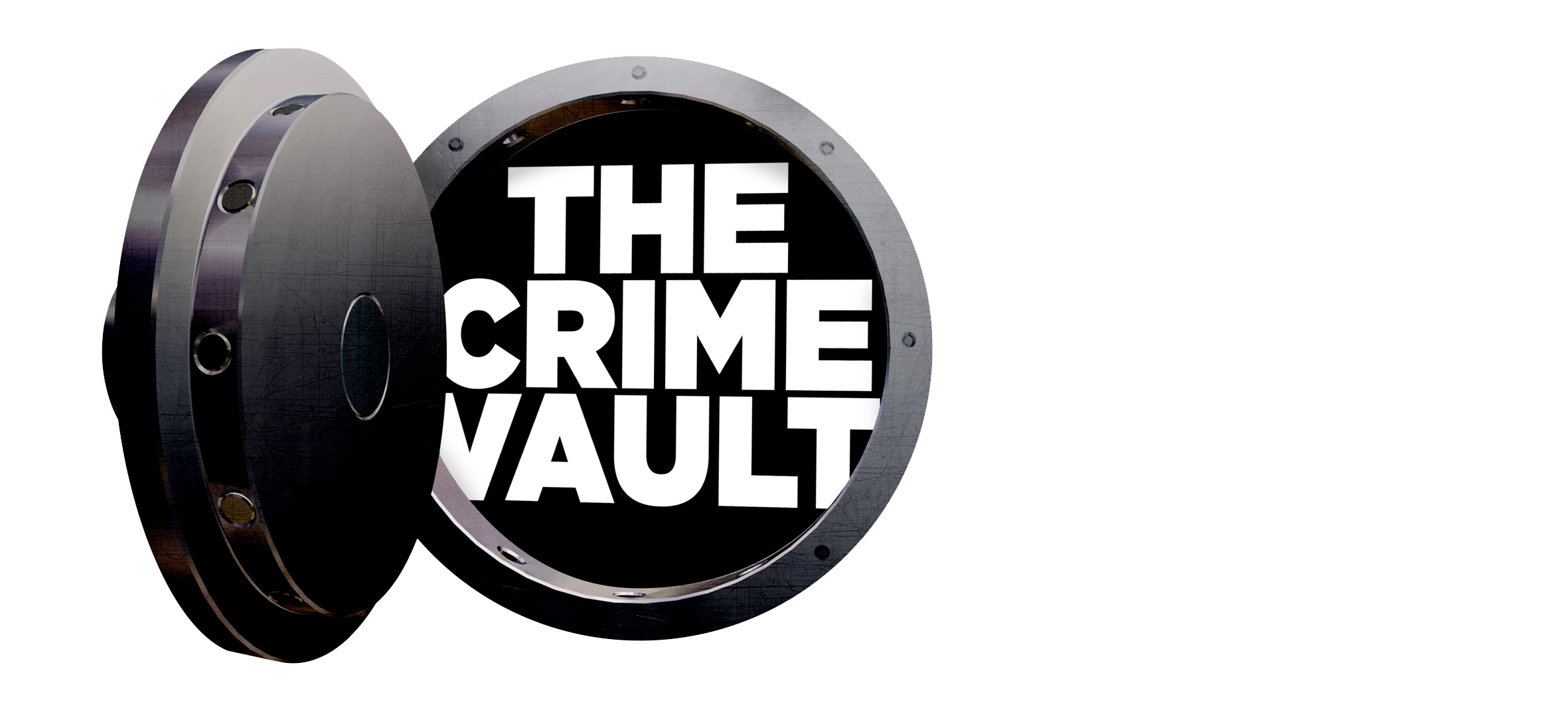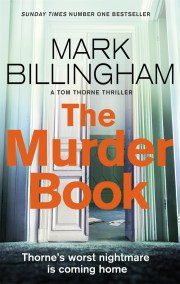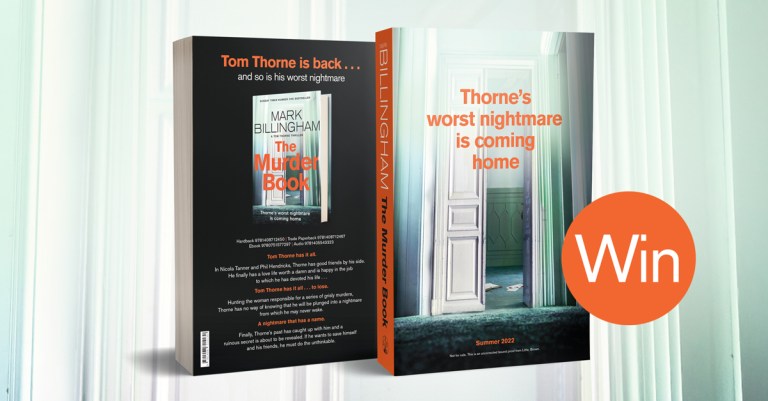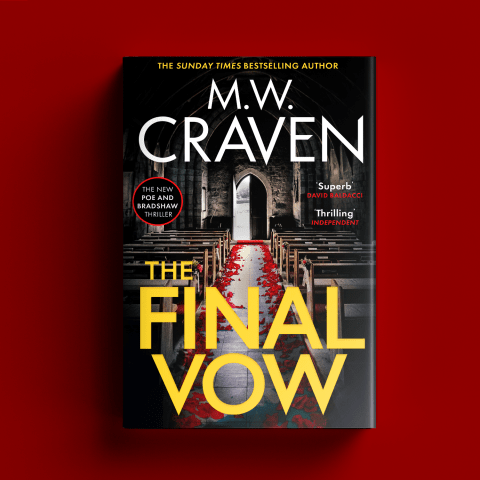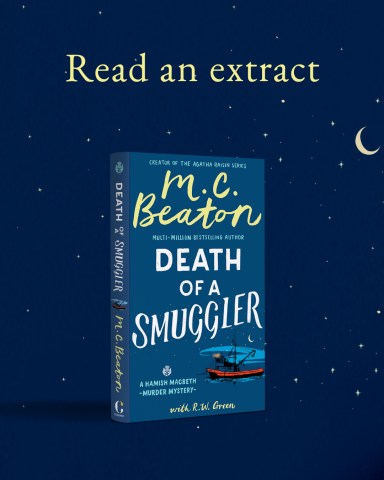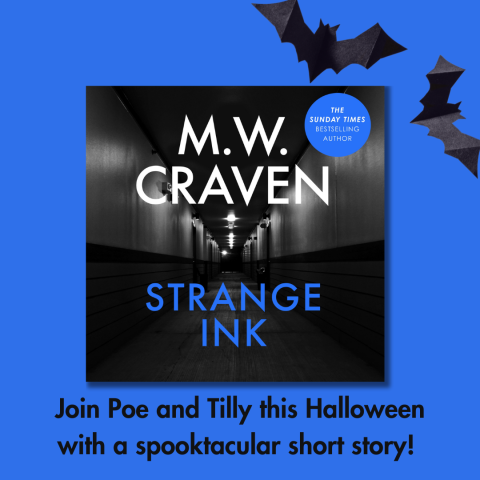Exclusive FREE Chapter
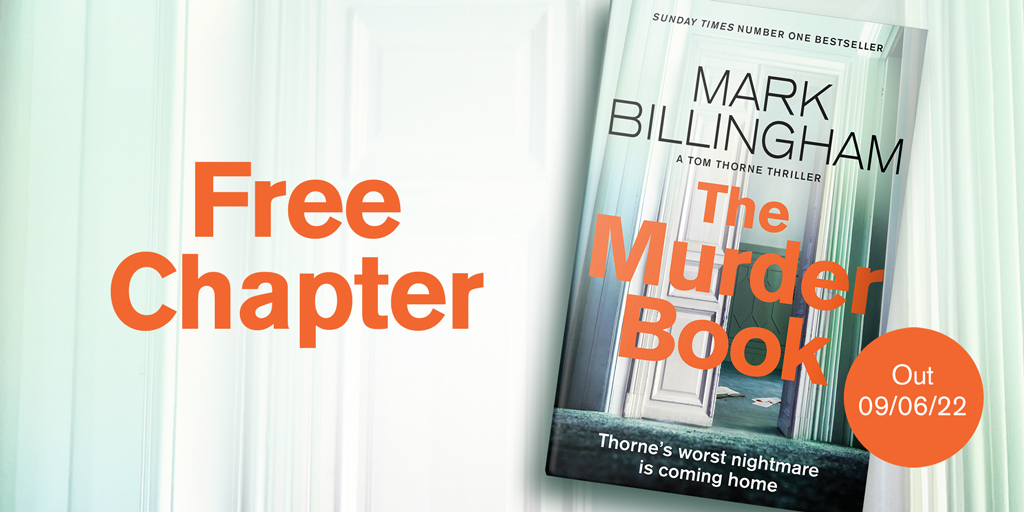
Enjoy reading a snippet of Mark Billingham’s new novel The Murder Book before anyone else! The Murder Book is the latest Tom Thorne novel, guaranteed to keep you up all night!
ONE
Detective Inspector Tom Thorne stood and looked around the bedroom of what was – the corpse aside – a perfectly unremarkable house in Gospel Oak. There was a low rattle in his throat as he sighed and the plastic of his bodysuit crackled when he turned his head. The man’s clothing lay tangled at the foot of the bed – trousers, shirt, socks and underwear – but everything else in the room pointed to occupants who, until very recently at least, had been tidy and organised. A selection of motoring magazines was perfectly aligned on one bedside table. Several paperbacks, a make-up bag and a couple of pill bottles sat neatly on the other. The doors of the wardrobes had, he presumed, been opened by those conducting the initial sweep of the scene and revealed shirts arranged by colour, sweaters folded carefully and shoes that had been polished and lined up perfectly in pairs. One look at the contents of the adjoining wardrobe was enough to confirm that the woman had been equally fastidious and, while half a dozen coppers, photographers and CSIs went quietly about their business in all parts of the house, Thorne could not help but imagine an altogether less grim routine as husband and wife moved easily around one another in what had once been a warm and welcoming room. A place of safety. The pair of them gently bickering as they hung up clothing or deposited it in the painted wicker laundry basket, before getting ready for bed.
An ordered life that, for one of them, had ended in carnage and chaos.
A CSI dressed in a similar plastic bodysuit to Thorne’s sidled up next to him. Left a beat or two. ‘I so hope the poor sod’s name was Douglas.’
‘Come again?’
The CSI nodded towards the bed next to which the on- call pathologist was making notes, and Thorne stared again at its lifeless occupant. The duvet was sky blue, a faded pattern of fluffy clouds now spattered scarlet. Higher up, it looked as though someone had emptied a bottle of red across the man’s chest, but it had not been wine that had leaked from the gash in his throat, or pooled on his pillow; a small puddle of blood on either side of his head.
‘Get it?’ the CSI asked.
‘I’m not with you,’ Thorne said.
The CSI raised his arms and pointed gloved fingers to the sides of his head, just in case Thorne needed it explaining. ‘Then he’d be Lugless Douglas.’ He stared at Thorne, waiting for the laugh, the wry smile at least and, when neither was forthcoming, he wandered away, shaking his head as though sadly disappointed that his joke had gone unappreciated.
Fallen on deaf ears.
Thorne turned as DI Nicola Tanner walked in from the landing, a second CSI close behind her. Tanner caught Thorne’s eye and shook her head. ‘No sign of them.’
The CSI mock-shuddered. ‘Looks like our killer took the ears with him.’
‘Oh, fuck,’ Thorne said.
‘One of those,’ Tanner said.
‘There is good news, though.’ The CSI – a woman who looked disturbingly like Theresa May but was a lot less scary – held up a handful of plastic evidence bags. ‘No shortage of trace.’ She selected one of the bags and dangled it, like treasure. ‘Found this nice little clump of hair just sitting there, trapped in dried sweat on the victim’s chest.’ She grinned. ‘And we’ve got bulbs.’
Thorne leaned forward to get a closer look at the strands of what appeared to be blonde hair. He understood why the woman was so cheerful. He knew that an intact bulb or root on a single hair meant DNA. ‘Pulled it out during a struggle, you reckon?’
‘Or during something else,’ Tanner said.
Thorne looked at her, then looked again at the dead man.
The CSI took a step away. ‘I’m guessing we’ll want this fast-tracked?’
‘You guess right,’ Thorne said.
Thorne and Tanner watched her walk away and, a few moments later, as soon as the look on Thorne’s face suggested that he wanted a rather more private conversation, Tanner moved towards the door, knowing that he would follow. The two of them stopped on the landing. They lowered their hoods, then pressed themselves in unison against the wall to allow two more technicians struggling with a battery of equipment into the bedroom.
‘It could be gangland related,’ Thorne said.
‘Could it?’
‘Why not? We’ve both seen this sort of thing before.’ He raised his hand and mimed the cutting. ‘Worse.’
‘You serious?’
‘Someone needs to send a message, whatever.’
‘Gangland?’ Tanner nodded back towards the bedroom.
‘He looks like the sort of bloke who irons creases into his pyjamas.’
‘Maybe he got involved in something he shouldn’t.’
‘Oh, I think he definitely did that.’
‘I’m just saying we shouldn’t rule anything out.’
‘And I’m just saying we shouldn’t piss about avoiding the obvious.’
The CSI who fancied himself as a comedian stepped out on to the landing carrying a plastic toolbox. Thorne said, ‘Nice way to round off the weekend,’ but got only a perfunctory nod in return. Thorne thought it was about what he deserved. He had heard worse jokes. He had heard sicker jokes, plenty of them. The banter and the off-colour cracks were important, they were necessary, and he guessed there was likely to be a good deal of such whistling in the dark in the days and weeks ahead.
Thorne turned to Tanner. Said, ‘Yeah, all right . . . ’
He wasn’t sure who he’d been trying to fool, because he knew Nicola Tanner well enough.
One of those.
He’d known what she meant straight away, because he’d been thinking the same thing himself. Every murder changed you, or it should, but there were those that bit a little deeper than others, left scars that were more vivid and scabs that could be picked at for longer. Some who committed murder, most of them, were ordinary and killed for ordinary reasons: they were angry, they were jealous, they were greedy, they snapped.
Some others were not.
Sweating and swaddled in a square, pale pink bedroom that stank of rotting meat, Thorne had known straight away that the individual he was now tasked with catching had not taken a life for any reason he would ever understand. Or would ever want to. That CSI had been trying to diffuse a little of the horror they were all confronted with, no more than that, but it had been impossible for Thorne to react the way he was expected to when something like a scream had already begun to build inside him.
When he’d been staring that horror full in the face and knowing that there was worse to come.
‘Where’s . . . ?’
Tanner stepped across to the banister and nodded down. ‘She’s in the kitchen. They’re going to take her to a friend’s place for the night, get Family Liaison organised, then we can interview her tomorrow.’
Thorne was already on his way down the stairs. ‘Let’s see if she’s up for a quick chat before she goes.’
Andrea Sumner was sitting at a long kitchen table, with a uniformed PC on either side of her. Both coppers stood when Thorne and Tanner entered. They stepped away from the table and offered to make tea, but Andrea Sumner shook her head. Taking the chair alongside Tanner, Thorne guessed that by now she’d probably been given enough to put her off the stuff for life. Not for the first time, he wondered why reaching for the PG Tips was so many people’s first instinct in times of crisis. It certainly wasn’t his.
‘Something stronger?’ he asked.
The woman shook her head again, as though she’d barely taken the question in.
‘We’re very sorry for your loss,’ Tanner said.
Andrea Sumner smiled and nodded, like she presumed it was something they habitually trotted out on such occasions. It was, of course, and they were words which always made Thorne bridle slightly, because nothing, and certainly not a man’s life, had been lost. It had been taken. Even so, nobody had come up with a better alternative, besides which he knew that Tanner had meant it. He’d heard it in her voice. Her own partner, Susan, had been stabbed to death on the doorstep of the house they shared only a few years earlier. She still grieved, and even if sometimes she struggled to express it, she was the only person in the house at that moment who came close to understanding how Richard Sumner’s wife felt.
Richard Sumner’s widow.
Thorne guessed she was in her mid-fifties. Thanks to the creeping ravages of rigor and lividity, he could not be sure if she was older or younger than the man in the bed upstairs. She was tall and slim. She wore a cream blouse beneath a brown V-neck sweater. She was pale-skinned, with red- rimmed eyes magnified by wire-rimmed glasses, and she was very still.
What she wasn’t was blonde.
‘I gather you’d been away for the weekend,’ Tanner said.
Another nod.
‘Liverpool, is that right?’
The woman had been staring at the space between them, out through the open doorway, but now her eyes slid slowly across to meet Tanner’s. ‘A teaching conference,’ she said. Her voice was flat, a hint of a northern accent perhaps. ‘It was just the two nights. A few of us go up there every November.’
‘And you got back late morning, today?’
‘I told them.’ She nodded towards the hallway in which the two uniforms were now lurking. ‘I told them all this.’
Which was how Thorne and Tanner knew as much as they did, but both were well aware that stories often changed, if only subtly, when people had lived with a situation such as this for a few hours. However hard it was to live with at all. Thorne leaned towards her. ‘We’re really sorry to be asking you these questions now, Andrea, and I promise you that we wouldn’t if it wasn’t important . . . but is there any way you could be a bit more specific about the time?’
She shook her head. She lifted her hands off the table then let them drop again. ‘Just after twelve, maybe. Quarter past . . . something like that. I was listening to some comedy thing in the car. Radio 4.’
‘That’s great,’ Tanner said. ‘We can check that.
Thank you.’
‘So, is that about the time you were always due to come back?’ Thorne asked.
‘Sorry?’
‘You weren’t expected back any earlier?’
She looked at him and said nothing for a few seconds, as though trying to work out what his question might mean.
‘No. I was always meant to be coming home this morning. I’ve got work tomorrow . . . ’ She stopped, realising what she’d said, that she would not be going back to work for a long time, if at all.
‘Right. So when did you speak to Richard last?’
‘Last night.’ Andrea’s mouth fell open and it seemed as if closing it again was causing her great discomfort. ‘He called me at the hotel about seven o’clock,’ she said finally. ‘We didn’t talk for very long. He told me he was going to get an early night.’
Tanner said, ‘Thank you,’ again before glancing at Thorne. They knew that when it came to time of death, the on-call pathologist would only provide a rough estimate. Now, at least, they had parameters. ‘That’s really helpful.’
Thorne looked past Andrea Sumner and out through the glazed back doors. Not quite four o’clock and it was already getting dark, but Thorne could make out the fence at the far end of the small garden, a narrow gate to one side of it. He was too far away to see if the bolts at top and bottom were open or not. He would check later. ‘The back gate leads out to an alleyway or something, does it?’
Andrea nodded, then turned suddenly to stare at the gate herself, as though Thorne might have spotted something; as if there might still be some visible trace of whoever it was the policeman clearly suspected of using it. ‘It runs behind all the houses. Why? What are you thinking?’
‘I’m not thinking anything,’ Thorne said. ‘Not yet.’
Now, Tanner leaned towards the woman and stretched out a hand until it was almost touching hers. ‘Andrea . . . you told our colleagues that everything seemed perfectly normal when you got back.’
‘That’s right.’
‘Like you left it, you said.’
‘Yes, everything was just fine.’ She nodded again and began to fiddle with the gold bracelet around her wrist. ‘That’s what I thought, anyway. The way it’s supposed to be . . . you know?’
‘OK.’
‘It wasn’t until I went upstairs . . . ’
Tanner heard the woman’s voice crack and watched her head drop, so she raised a hand to let the officers in the cor- ridor know that she and Thorne were about done. Thorne pushed his chair back and grimaced at the scraping noise while Tanner was saying something about ongoing support and counselling services. He let her get on with it because she was so much better at that stuff than he was.
‘Absolutely,’ he said, when Tanner had finished. ‘Please don’t hesitate.’
Thorne wasn’t surprised that Andrea Sumner had once again chosen not to mention the opened wine bottle and those two dirty glasses that the first officers on the scene had discovered in the sitting room. She might not have noticed them, but Thorne was fairly certain that she had. A bottle and two glasses that had been carefully bagged up and boxed by CSIs and which Thorne was damn sure had not been there when Andrea had left the house two days earlier. It would be hard enough coming to terms with the fact that her husband had been killed. How he had been killed.
She would not want to spend too much time wondering what had happened to that early night.
The road had been sealed off at both ends and crime scene tape strung across it on either side of the Sumner house.
There were half a dozen emergency vehicles parked in the middle of the road or up on the pavements and a good many onlookers were being kept politely at a distance. As he waited for coffee at the Met Police branded drinks wagon, Thorne saw one woman, who had found herself a nice little gap between cars and coppers, reach out to touch the tape and nod, satisfied.
When he and Tanner stepped away, coffees in hand, Thorne noticed a woman waving at him from the garden of the house opposite. He walked across and asked if he could help.
The woman peered at the lanyard around Thorne’s neck. ‘Is everything OK with Richard and Andrea?’
She would find out soon enough anyway. Police could instruct the street’s occupants to stay inside temporarily, but could hardly insist that curtains were drawn or windows blacked out. They would see the body bag being removed from the house.
‘Not really,’ Thorne said.
‘Oh God,’ the woman said. ‘That’s awful.’ ‘So you know them, then?’
‘Well, yes, they’re neighbours. I mean . . . not well. Just a few words in the street every so often, popping over there for a drink at Christmas, that kind of thing.’ Then, ‘Oh, God,’ again.
‘Did you see Richard yesterday evening?’ ‘Not to talk to, no.’
‘Any comings and goings?’
The woman took a few seconds, as though she was thinking about it, though Thorne guessed that she simply didn’t want to appear over-eager. ‘I saw his car pulling off the drive . . . I don’t know, about seven, half seven? Then I heard him come back later on, maybe a couple of hours after that. Well, I actually heard his garage door opening. He’s got one of those remote things for it and the door’s really bloody noisy.’
‘Right.’
‘I couldn’t tell you the last time he used it, because him and Andrea usually just park in the drive, but when I heard the noise and looked out last night, I saw him driving into the garage. Maybe he wanted to work on the car or something.’ Thorne already had a fair idea of why Richard Sumner had parked the car out of sight, but said, ‘Yes, maybe.’ The car was still in the garage, of course, and Thorne had already seen that there was a door at the rear of it that opened directly into the Sumners’ garden. He thanked the woman for her help and walked back across the road to join Tanner. He told her what the neighbour had seen, what he
thought the implications of it were.
‘Where would we be without curtain twitchers?’ Tanner said.
‘Yeah.’ They would be starting a full house-to-house as soon as possible, but it was useful to have information like this good and early.
They stood in silence for half a minute or so, sipping their coffees.
‘So, a woman, you reckon?’
Thorne looked at her. There might have been a time when, despite knowing full well that women could be every bit as homicidal as men, a degree of violence such as the one they were now confronted with might at least have given the average detective . . . pause for thought. Thorne remembered the last case of multiple murder he and Tanner had worked on together; the woman at the centre of it.
He said, ‘Looks that way.’
‘Doesn’t have to be a woman, of course,’ Tanner said. ‘Maybe Mr Sumner had a different kind of secret life.’
‘Maybe.’
‘We might find out when we talk to the wife again.’ Thorne poured what was left of his coffee into the gutter,
thinking about what was likely to be an extremely awkward conversation. ‘That’s going to be fun.’
‘I don’t think it’s going to be a barrel of laughs for her either.’
Thorne turned at a wave from the Sumners’ front door.
A signal that they were ready to bring out the victim’s body.
‘Fair point,’ he said.
